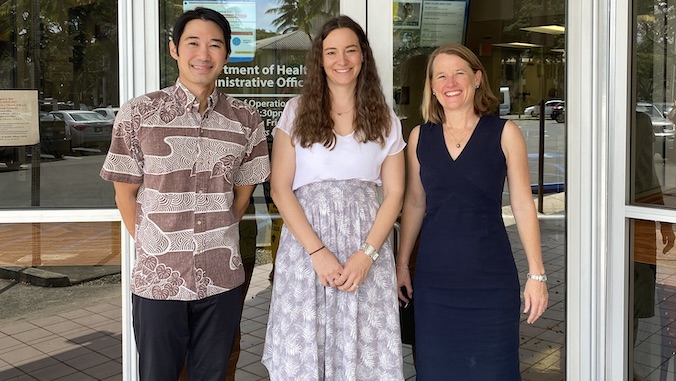
A recent University of Hawaiʻi at Mānoa PhD graduate is the first to take on a new role that is designed to improve health outcomes for Hawaiʻi communities. UH Mānoa’s Thompson School of Social Work & Public Health and the Hawaiʻi State Department of Health (DOH) partnered to create the position of a post-doctoral resident scholar in public health, now held by Simone Schmid.
Typically, such positions allow recent doctoral graduates to begin their careers while still receiving mentorship from experienced colleagues. Schmid has been in her role since summer 2022.
“The new position lies at the intersection of public health practice and scholarly activities,” said Tetine Sentell, interim dean of the Thompson school, who oversees the academic aspects of the position. “We want to encourage early-career professionals to conduct their work through the lens of health equity and improve the health of all Hawaiʻi communities by addressing the social determinants of health.”
Improving health equity across state
One project that Schmid has worked on is evaluating Hawaiʻi‘s stroke awareness program and care system. The program aims to reach people in rural Hawaiʻi and increase public awareness of the importance of calling an ambulance, rather than attempting to drive to the ER, if a family member may be having a stroke. Schmid’s work illuminated the aspects of the program that are effective, as well as those that need improvement.
…UH and the DOH are working together to move Hawaiʻi forward and improve health equity across the state
—Simone Schmid
She has also worked on projects related to preventing tobacco use, promoting healthy eating and increasing physical activity.
“I feel so privileged to be a part of this partnership. My knowledge and skills are expanding enormously,” said Schmid. “The creation of this scholar position shows how UH and the DOH are working together to move Hawaiʻi forward and improve health equity across the state, and is an innovative way to bridge the distance between academia and the state public health agency.”
Developing skills for future workforce
“This position allows us to work with a motivated scholar to develop the skills needed to stay here in our system in Hawaiʻi,” said Lance Ching, an epidemiologist with the DOH’s Chronic Disease Prevention & Health Promotion Division, who oversees the agency’s aspects of the position.
For example, many DOH positions require experience in writing grants or holding a leadership position. In her role, Schmid will have opportunities to do both. “By getting involved in work for both the state government and the university, Schmid will be well-positioned to meet future public health challenges in Hawaiʻi,” Ching said.
Long-term goals
Over the longer-term, Schmid’s goal is to work toward increasing physical activity in Hawaiʻi, including for people with physical disabilities. She’s applying for a grant to determine the “metabolic equivalent,” or MET, for outrigger canoe paddling. METs show how many calories a person burns when engaged in an activity.
“The MET for many activities such as soccer and running have been determined, but there’s less information about the activities that are culturally relevant to Hawaiʻi,” she said. The MET for hula was recently determined by UH experts, and she wants to expand the work to other activities such as paddling and surfing, including MET determinations for people with physical disabilities.
Schmid feels she will be well prepared to enter Hawaiʻi‘s public health workforce at the completion of her scholar position. “I wish a bridge position between UH and DOH like this would exist for the long-term. I truly believe in the synergies of it,” she said.

